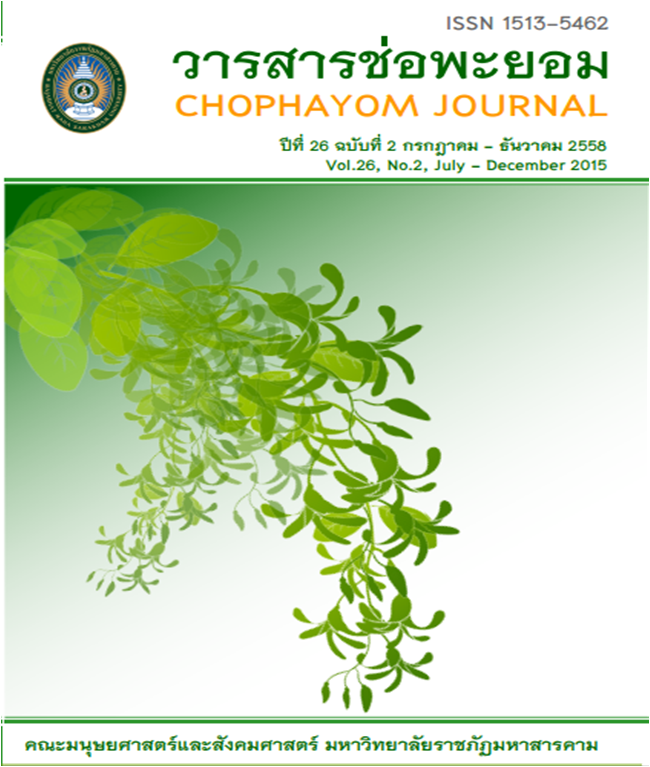การเปรียบเทียบผลการเรียนประเด็นปัญหาทางสังคมที่เกี่ยวข้องกับการใช้วิทยาศาสตร์โดยใช้การเรียนแบบผสมผสานตามวิธีการทางวิทยาศาสตร์ กับวัฏจักรการเรียนรู้ 7 ขั้นที่มีต่อความสามารถในการโต้แย้งและการคิดวิพากษ์วิจารณ์ ของนักเรียนระดับประกาศนียบัตรวิชาชีพ (ปวช.) ชั้
Abstract
บทคัดย่อ
การวิจัยครั้งนี้มีความมุ่งหมายเพื่อเปรียบเทียบความสามารถในการโต้แย้ง และการคิดวิพากษ์วิจารณ์ของนักเรียนที่มีผลการเรียนวิทยาศาสตร์แตกต่างกัน ที่เรียนประเด็นปัญหาทางสังคมที่เกี่ยวข้องกับการใช้วิทยาศาสตร์ ด้วยรูปแบบการเรียนต่างกัน ของนักเรียนระดับประกาศนียบัตรวิชาชีพ (ปวช.) ชั้นปีที่ 2 จำนวน 58 คนจาก 2 ห้องเรียน ซึ่งได้มาโดยการสุ่มแบบกลุ่ม (Cluster Random Sampling) โดยแบ่งออกเป็น 2 กลุ่ม คือ กลุ่มทดลองที่ 1 จำนวน 29 คน เรียนด้วยรูปแบบผสมผสานตามวิธีการทางวิทยาศาสตร์ และกลุ่มทดลองที่ 2 จำนวน 29 คน เรียนด้วยรูปแบบผสมผสานตามวัฏจักรการเรียนรู้ 7 ขั้น เครื่องมือที่ใช้ในการรวบรวมข้อมูลประกอบด้วย 1) แผนการจัดการเรียนรู้ประเด็นปัญหาทางสังคมที่เกี่ยวข้องกับการใช้วิทยาศาสตร์ 3 เรื่อง ได้แก่ พืชดัดแปลงพันธุกรรม (GMO) การโคลนนิ่งสัตว์ และการปลูกถ่ายอวัยวะมนุษย์ โดยใช้การเรียนแบบผสมผสานตามวิธีการทางวิทยาศาสตร์กับแบบผสมผสานตามวัฏจักรการเรียนรู้ 7 ขั้น อย่างละ 3 แผน ๆ ละ 3 ชั่วโมงต่อสัปดาห์ 2) แบบทดสอบความสามารถการโต้แย้ง แบ่งเป็น 4 ฉบับ ๆ ละ 4 ข้อ และ 3) แบบทดสอบการวัดการคิดเชิงวิพากษ์วิจารณ์ รายด้าน 4 ด้าน ได้แก่ ด้านการพิจารณาความน่าเชื่อถือของแหล่งข้อมูลและการสังเกต ด้านการนิรนัย ด้านการอุปนัย และด้านการระบุข้อตกลงเบื้องต้น จำนวน 40 ข้อ สถิติที่ใช้ในการทดสอบสมมติฐาน ได้แก่ Paired t-test และ F-test (Two-way MANCOVA และ ANCOVA)
ผลการวิจัยพบว่า นักเรียนโดยส่วนรวมและจำแนกตามผลการเรียนวิทยาศาสตร์หลังเรียนประเด็นปัญหาทางสังคมที่เกี่ยวข้องกับการใช้วิทยาศาสตร์โดยใช้การเรียนแบบผสมผสานตามวิธีการทางวิทยาศาสตร์ และวัฏจักรการเรียนรู้ 7 ขั้น มีการพัฒนาความสามารถในการโต้แย้งเพิ่มขึ้นจากการสอบครั้งที่ 1-4 และมีการคิดเชิงวิพากษ์วิจารณ์โดยรวมและเป็นรายด้าน 4 ด้าน เพิ่มขึ้นจากก่อนเรียน (p<.001) นักเรียนที่มีผลการเรียนวิทยาศาสตร์ต่างกัน มีความสามารถในการโต้แย้งและการคิดเชิงวิพากษ์วิจารณ์โดยรวมและ รายด้านทั้ง 4 ด้านไม่แตกต่างกัน (p≥.053) ส่วนนักเรียนที่เรียนแบบผสมผสานตามวัฏจักรการเรียนรู้ 7 ขั้น มีเฉพาะการคิดเชิงวิพากษ์วิจารณ์โดยรวมและเป็นรายด้านทั้ง 3 ด้าน (ยกเว้นด้านความสามารถในการนิรนัย) มากกว่านักเรียนที่เรียนด้วยการเรียนแบบผสมผสานตามวิธีการทางวิทยาศาสตร์ (p≤.013) และไม่มีปฏิสัมพันธ์ระหว่างผลการเรียนวิทยาศาสตร์กับรูปแบบการเรียนต่อความสามารถในการโต้แย้งและการคิดเชิงวิพากษ์วิจารณ์โดยรวมและรายด้าน (p≥.282)
คำสำคัญ : การเรียนแบบผสมผสานตามวิธีการทางวิทยาศาสตร์,การเรียนแบบผสมผสานตามวัฏจักรการเรียนรู้ 7 ขั้น ,
ความสามารถในการโต้แย้ง,การคิดเชิงเหตุผล , ประเด็นปัญหาทางสังคมที่เกี่ยวข้องกับการใช้วิทยาศาสตร์
ABSTRACT
This research aimed to compare the effects of learning socioscientific issues using the mixed methods bused on the scientific method and the 7E – learning cycle approach on argumentation and critical thinking of 58 second year vocational certificate. students with different science learning outcomes. They were obtained using the cluster random sampling technique and divided into 2 groups : the first group of 29 students learned using the mixed methods based on the scientific method and the second group of 29 students using the mixed methods based on 7-E learning cycle approach. Instruments for the research included : 1) learning plans on 3 socioscientific issues : Genetically Modified Plants, Animal Cloning and Organ Transplantation, using the mixed methods based on the scientific method and the 7-E learning cycle approach, 3 plans each and each plan for 3 hours of learning in a week ; 2) four argumentation tests, 4 items each ; and 3) the critical thinking abilities test with 4 subscales and 40 items : credibility of data resource and observation, deduction, induction and identification of assumptions. The collected data were analyzed for testing hypotheses by using the paired t – test and the F – test (Two – way MANCOVA and ANCOVA).
The research findings found that the students as a whole and as classified according to science learning outcome who learned the socioscientific issues using the mixed methods based on the scientific method and the 7-E learning cycle approach showed developments of argumentation abilities from the 1st test to the 4th test; and showed gains in critical thinking abilities in general and in each of 4 subscales from before learning (p<.001). ) The students with different science learning outcomes did not differently indicate argumentation and critical thinking abilities after learning socioscientific issues (p≥.053) However, the students who learned thesocioscientific issues using the mixed methods based on the 7-E learning cycle approach indicated more critical thinking in general and in 3 subscales (except for the deduction subscale) than the counterpart students (p≤.013). Whereas,statistical interactions of learning method with learning outcome on argumentation and critical thinking were not found to be significant (p≥.282).
Keywords: Mixed Methods based on the Scientific Method,Mixed Methods Based on the 7E-Learning Cycle Approach , Argumentation ,Critical Thinking,Socioscientific Issues






